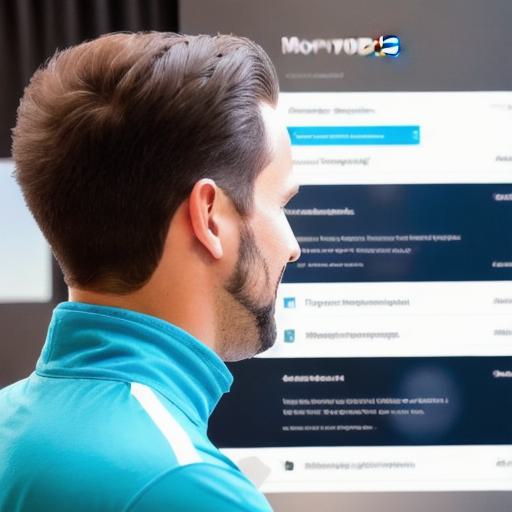Introduction
In today’s competitive job market, recruiters and HR professionals need to work harder than ever to attract top talent. But with the right marketing tools in hand, you can streamline your recruitment process and make it more efficient and effective. In this article, we will explore some of the best marketing tools for recruitment strategies, along with tips on how to optimize them for maximum impact.
1. Social Media Marketing: A Powerful Recruitment Tool
With over 3.7 billion people using social media platforms worldwide, it’s no surprise that social media has become a powerful tool for recruitment. By leveraging social media marketing, you can reach out to potential candidates and engage with them in a way that’s both personalized and professional. Here are some of the key benefits of social media marketing for recruitment:
- Increased brand awareness: Social media platforms like LinkedIn, Twitter, and Facebook allow you to share your company culture and values, helping potential candidates get to know who you are and what you stand for.
- Cost-effective advertising: Social media ads are often more affordable than traditional job board or print ads, making it easier to reach a wider audience without breaking the bank.
- Targeted advertising: With social media, you can target your ads based on demographics like age, location, and interests, ensuring that your message is seen by the right people.
- Improved engagement: Social media allows for two-way communication between recruiters and candidates, which can help build a stronger relationship and improve the overall candidate experience.
Case Study: HubSpot’s Successful Social Media Recruitment Strategy
HubSpot, a leading inbound marketing software company, has used social media to great effect in its recruitment efforts. The company uses LinkedIn as its primary social media platform for recruiting and has developed a successful content strategy that focuses on sharing engaging and informative posts about the company culture, team values, and job opportunities.
"Social media is a critical part of our recruiting strategy," says Kelsey Miller, HubSpot’s Talent Acquisition Manager. "We use it to build brand awareness, engage with candidates, and share content that showcases our unique company culture."
According to Miller, HubSpot has seen a significant increase in the number of qualified candidates applying for jobs as a result of its social media marketing efforts. "Social media has helped us reach a wider audience and attract top talent who are passionate about our mission and values," she says.
2. Email Marketing: A Personalized Approach to Recruitment
While social media is great for reaching out to a wide audience, email marketing can be even more effective when it comes to recruiting individual candidates. By using personalized email campaigns, you can tailor your message to each candidate’s needs and interests, helping you stand out from the competition and increase the likelihood of a successful hire. Here are some key benefits of email marketing for recruitment:
- Cost-effective advertising: Email marketing is often less expensive than other forms of advertising, making it an affordable option for small and medium-sized businesses.
- Targeted advertising: With email marketing, you can segment your audience based on demographics, interests, and job function, ensuring that your message is seen by the right people.
- High ROI: Email marketing has a high return on investment (ROI), with some studies suggesting that it generates up to $38 for every dollar spent.
- Personalized communication: Email marketing allows you to communicate with candidates in a more personalized way, which can help build stronger relationships and improve the overall candidate experience.
Case Study: Zappos’ Successful Email Recruitment Strategy
Zappos, an online shoe and clothing retailer, has developed a highly successful email recruitment strategy that focuses on building relationships with candidates and providing them with personalized support throughout the hiring process. The company sends regular emails to job applicants, offering tips and advice on everything from resume writing to interview preparation.
"Email marketing is a critical part of our recruiting strategy," says Zappos’ Chief People Officer, Holli Burgon. "We use it to build relationships with candidates, provide them with valuable information, and keep them engaged throughout the hiring process."

According to Burgon, Zappos has seen a significant increase in the number of qualified candidates applying for jobs as a result of its email marketing efforts. "Email marketing has helped us attract top talent who are passionate about our mission and values," she says.
3. Video Marketing: A Powerful Way to Showcase Your Company Culture
Video is one of the most engaging forms of content out there, and it’s no surprise that video marketing has become an increasingly popular tool for recruitment. By creating videos that showcase your company culture, values, and team members, you can give potential candidates a glimpse into what it’s like to work at your organization and help them decide if it’s the right fit for them. Here are some key benefits of video marketing for recruitment:
- Increased engagement: Video is highly engaging and can help capture the attention of potential candidates who might otherwise be too busy or distracted to read job descriptions or scroll through social media feeds.
- Improved candidate experience: Video can provide a more personalized and interactive way for candidates to learn about your company, helping them feel more engaged and invested in the hiring process.
- Cost-effective advertising: Video marketing is often more affordable than other forms of advertising, making it an attractive option for small and medium-sized businesses.
- Authentic communication: Video allows you to communicate with candidates in a more authentic way, which can help build trust and credibility and improve the overall candidate experience.
Case Study: Google’s Successful Video Recruitment Strategy
Google has developed a highly successful video recruitment strategy that focuses on showcasing its unique company culture and values through engaging and informative videos. The company creates a wide range of videos, from employee interviews to behind-the-scenes looks at the offices, events, and teams.

"Video is a critical part of our recruiting strategy," says Google’s Senior Manager of People Operations, Jacqueline Resendez. "We use it to showcase our company culture and values, engage with candidates, and provide them with valuable information about what it’s like to work at Google."
According to Resendez, Google has seen a significant increase in the number of qualified candidates applying for jobs as a result of its video marketing efforts. "Video has helped us attract top talent who are passionate about our mission and values," she says.
4. SEO Optimization: Boosting Your Visibility in Job Search Engines
While social media, email, and video marketing can be highly effective tools for reaching out to individual candidates, SEO optimization is crucial if you want your recruitment efforts to be visible to a wider audience. By optimizing your job postings and website content for search engines, you can ensure that your organization shows up at the top of search results when potential candidates are searching for jobs in your industry. Here are some key benefits of SEO optimization for recruitment:
- Increased visibility: By optimizing your job postings and website content for search engines, you can increase your visibility to a wider audience of job seekers who might not have otherwise found your organization.
- Improved candidate quality: Search engine optimization (SEO) can help attract top talent who are actively searching for jobs in your industry and who are more likely to be a good fit for your organization.
- Cost-effective advertising: SEO is often less expensive than other forms of advertising, making it an attractive option for small and medium-sized businesses.
- Better candidate engagement: By optimizing your website content for search engines, you can provide potential candidates with valuable information about your company, culture, and values, helping them make more informed decisions about whether or not to apply for a job.
Case Study: LinkedIn’s Successful SEO Recruitment Strategy
LinkedIn, the world’s largest professional networking site, has developed a highly successful SEO recruitment strategy that focuses on optimizing its job postings and website content for search engines. The company uses a variety of SEO tactics, including keyword research, on-page optimization, and link building, to ensure that its job postings show up at the top of search results when potential candidates are searching for jobs in their industry.
"SEO is a critical part of our recruiting strategy," says LinkedIn’s Senior Director of Talent Acquisition, Patrick Woolley. "We use it to increase our visibility to a wider audience of job seekers who might not have otherwise found us, and to attract top talent who are actively searching for jobs in our industry."
According to Woolley, LinkedIn has seen a significant increase in the number of qualified candidates applying for jobs as a result of its SEO marketing efforts. "SEO has helped us attract top talent who are passionate about our mission and values," he says.
Conclusion
Recruitment is a complex process that requires a variety of tools and strategies to be successful. By leveraging social media, email, video, and SEO optimization, you can create a highly effective recruitment strategy that will help you attract top talent and grow your business. Remember, the key to success in recruitment is to provide potential candidates with valuable information about your company, culture, and values, and to make the hiring process as engaging and personalized as possible. With the right tools and strategies in place, you can create a winning recruitment strategy that will help you build a strong and successful team.




